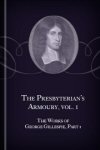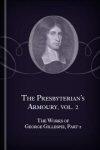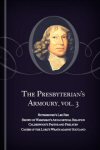The Presbyterian’s Armoury in Three Volumes
Digital Logos Edition
This product has been transferred from Community Pricing to Pre-Pub. The actual funding level may be lower than it appears, which could delay production. The amount of funding still needed will be evaluated and updated soon.
Overview
George Gillespie was a well-known public speaker and controversialist in the early seventeenth century. His contribution to Presbyterian ecclesial governance and church polity through his writings and debates has had a lasting impact that stretches into today. The Presbyterian’s Armoury was written to compile the historical apologetic works of Scottish Presbyterian ecclesiology, and these two volumes collect numerous writings of George Gillespie and a brief biography of Gillespie written by church historian William M. Hetherington. These writings provide a key look at the emergent Scottish Reformed theology of the seventeenth century and of Scotland’s then-swinging political mood.
Additionally, The Presbyterian’s Armoury contains writings from other leading Scottish Reformers of the seventeenth century—notably, Samuel Rutherford, David Calderwood, James Guthrie, and John Brown of Wamphray—providing first-hand insight into the Reformation and the Presbyterian church taking shape.
In Logos, these writings seamlessly integrate with the rest of your library. References to Scripture and the Westminster Confession link to their sources in your library. These writings also are fully searchable, allowing you to quickly engage with the early-sixteenth-century dialogue surrounding the Scottish Reformation.
Key Features
- Contains back-and-forth dialogues between Gillespie and his opponents
- Provides direct insight to early seventeenth-century Reformation writings
- Addresses issues of church government and polity
Praise for the Print Edition
Gillespie was one of the ablest, and the most learned controversialists of his day. His works are exceedingly valuable, both for their logic, their learning, and their spirituality. His style is vigorous, though perhaps occasionally turgid. This present edition of his works . . . will be duly prized by those who know their scarcity before.
—The Presbyterian Review and Religious Journal
Product Details
- Title: The Presbyterian’s Armoury
- Authors: George Gillespie, William M. Hetherington, Samuel Rutherford, David Calderwood, James Guthrie, and John Brown of Wamphray
- Publisher: Hamilton, Adams & Co.
- Publication Date: 1846
- Volumes: 3
- Pages: 1,693
Individual Titles
- The Presbyterian’s Armoury: The Works of George Gillespie, vol. 1 by George Gillespie
- The Presbyterian’s Armoury: The Works of George Gillespie, vol. 2 by George Gillespie
- The Presbyterian’s Armoury: Lex, Rex, or The Law and the Prince by Samuel Rutherford

Contents:
- Memoir of Gillespie by William M. Hetherington
- Dispute against the English Popish Ceremonies Obtruded on the Church of Scotland
- An Assertion of the Government of the Church of Scotland
- A Brotherly Examination of Some Passages in Mr. Coleman’s Sermon on Job xi.20
- Nihil Respondes: A Discovery of the Extreme Unsatisfactoriness of Mr. Coleman’s Piece, “A Brotherly Examination Re-examined”
- Male Audis: An Answer to Mr. Coleman’s Male Dicis
- One Hundred and Eleven Propositions concerning the Ministry and Government of the Church
- A Sermon Preached before the Honourable House of Commons at their Late Solemn Fast
- A Sermon Preached before the Right Honourable the House of Lords in the Abbey Church at Westminster
George Gillespie (1613–1648) was a Scottish Presbyterian theologian of Kirkcaldy, Scotland. He studied at St. Andrews University, but did not accept episcopal ordination at the time of his graduation. Soon after, Scotland dismissed the authority of the bishops, and Gillespie was ordained as a minister of Fife by the presbytery of Kirkcaldy and joined the Glasgow Assembly. He later moved to Edinburgh and joined the Westminster Assembly, where he participated in nearly all discussions on church government, discipline, and worship, and had a hand in drafting the Westminster Confession. He was long remembered as a supporter of Presbyterianism, always ready and armed for debate, and despite passing away at 36 years of age, had a long-lasting impact on Reformed and Presbyterian polity.
William Maxwell Hetherington (1803–1865) was a Scottish minister, poet, and historian who was educated at the University of Edinburgh. In 1857, he was appointed the professor of apologetics and systematic theology at the Free Church College in Glasgow.

Contents:
- Aaron’s Rod Blossoming: The Divine Ordinance of Church Government Vindicated
- Treatise of Miscellany Questions
- Notes of Debates and Proceedings of the Assembly of Divines at Westminster
George Gillespie (1613–1648) was a Scottish Presbyterian theologian of Kirkcaldy, Scotland. He studied at St. Andrews University, but did not accept episcopal ordination at the time of his graduation. Soon after, Scotland dismissed the authority of the bishops, and Gillespie was ordained as a minister of Fife by the presbytery of Kirkcaldy and joined the Glasgow Assembly. He later moved to Edinburgh and joined the Westminster Assembly, where he participated in nearly all discussions on church government, discipline, and worship, and had a hand in drafting the Westminster Confession. He was long remembered as a supporter of Presbyterianism, always ready and armed for debate, and despite passing away at 36 years of age, had a long-lasting impact on Reformed and Presbyterian polity.

Contents:
- “Sketch of the Life of Samuel Rutherford”
- “Lex Rex” by Samuel Rutherford
- “An Epistle to the Christian Reader”
- “An Apologetical Relation of the Particular Sufferings of Faithful Ministers and Professors of the Church of Scotland by” John Brown of Wamphray
- “The Pastor and the Prelate” by David Calderwood
- “Causes of the Lord’s Wrath against Scotland” by James Guthrie
- “A Humble Acknowledgment of the Sins of the Ministry of Scotland”
Samuel Rutherford (c. 1600–1661) was a Scottish Presbyterian theologian and author. He served as a Scottish commissioner to the Westminster Assembly. Rutherford was a regent of humanity at Edinburgh University.
John Brown of Wamphray (c. 1610–1679) graduated at the University of Edinburgh in 1630. He was a highly respected peer of Samuel Rutherford, mentioned frequently in Rutherford’s letters. For many years, he was settled in his duties as a pastor and church leader, and didn’t become involved in parliament and the Reformation of Scotlant until 1662. He was one of the first ministers arrested and excommunicated for opposing King Charles II’s involvement in the affairs of the church.
James Guthrie (1612–1661) was one of the most zealous protesters during the 1600s. James Guthrie was educated at St. Andrews, focusing on classics and philosophy. He was known for his practical religious principles. He was sentenced to death for treason by King Charles II, and executed as a martyr in 1661.
David Calderwood (1575–1650) was a historian and theological writer who graduated from the college of Edinburgh. He is best known for his The History of the Kirk of Scotland, which provides the most extensive account of the ecclesiastical history of Scotland during the Reformation.
Reviews
1 rating

Maxim Farocanag
2/9/2023
Rev. Todd Ruddell
5/27/2015
A very important work for Presbyterian history, Biblical foundation, and practice.